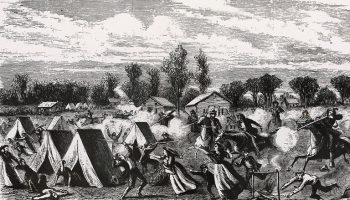
The coronavirus pandemic has cast great shape of inequality — in education, income distribution, job opportunities — in a very harsh and clear light, but what's especially troubling to Javier Rodríguez are some newly-discovered correlations between health outcomes and racial disparities in health and how U.S. politics heavily influences both.
Earlier this month, a global audience joined Rodríguez for any faculty webinar on \”Politics, COVID-19, and Racial Disparities in Health.\”
Rodríguez, who's the Mary Toepelt Nicolai and George S. Blair Assistant Professor of Politics and Government, and co-director of the university’s Inequality and Policy Research Center, discussed how these correlations are affecting vulnerable populations (for example, immigrants and minority populations) within the U.S. throughout the COVID-19 pandemic.
During the path of the hour-long webinar, Rodriguez enumerated many of the politically-initiated mechanisms affecting health, including income and wealth inequality (which his research has found to be associated with worse health outcomes), in addition to how tax cuts (initiated by politicians) directly affect states of health.
The Politics of Health Outcomes
Since the 1960s, Rodríguez told the audience, and especially throughout the Reagan and Bush administrations, politics continues to be the key driver underscoring health inequality and subsequent mortality rates in the U.S.
Indeed, his research sheds new light around the political consequences of minorities' excess mortality and premature death one of the poor and working-class individuals.
Diverging party policy agendas also modify the health situations of communities in poorer areas in different ways. It is easy for lay individuals to forget, Rodríguez said, the way the conditions by which individuals are born, live, work, play, and age directly influence health outcomes.
Today, as the nation and also the world is in its seventh month of quarantine due to the COVID-19 pandemic, health problems in vulnerable communities have been exacerbated much more.
\”We have observed the continuation of persistent, big, pre-existing racial and socioeconomic disparities in health during the pandemic,\” Rodríguez said. \”The social conditions – living in high-density neighborhoods, having poor work conditions – that facilitate more infections will also be racially patterned, as well as underlying risk conditions like diabetes.\”
Regarding COVID-19 and how it affects immigrant populations, Rodríguez mentioned poor or low-education, lower rates of insurance policy, less access and lower quality of healthcare services, higher unemployment, work instability, weaker job benefits and lower amounts of political power and representation as just a few of the markers that separate them from communities which have been less adversely impacted by herpes.
In Rodríguez’ estimation, public health and epidemiology as disciplines have been successful at identifying solutions to the issues of health disparity.
\”The question then,\” he concluded, \”is not what you can do. We know that. The actual question is about politics and health. The issue for that Twenty-first century is, how can we change politics to produce better health outcomes for everyone?\”





